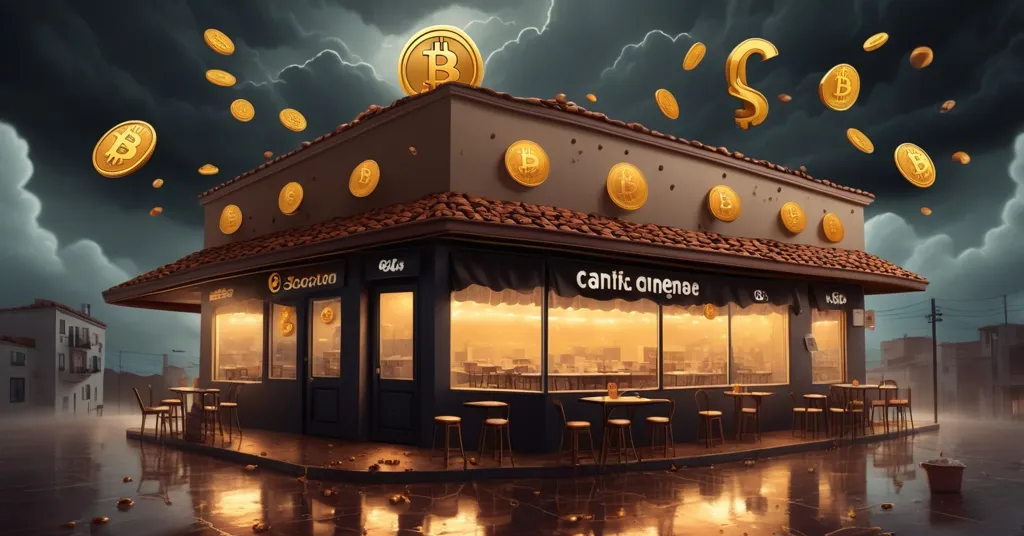Vanadi Coffee Risks $1.17B on Bitcoin Despite Massive Losses—Bold Move or Madness?

Spanish Cafe Chain Vanadi Coffee Risks $1.17B on Bitcoin Amid Deep Financial Losses
A tiny Spanish cafe chain with just six outlets has stunned the financial and crypto worlds alike. Vanadi Coffee has secured stakeholder approval for a jaw-dropping €1 billion ($1.17 billion) Bitcoin investment plan, a move that’s either visionary or utterly unhinged given their mounting losses. Paired with a recent purchase of 20 BTC, this struggling business is betting the house on cryptocurrency to turn its fortunes around.
- Colossal Gamble: Vanadi Coffee aims to invest $1.17 billion in Bitcoin as a treasury asset.
- Financial Abyss: Reported a $3.7 million loss in 2024, a 15.8% worsening from the prior year.
- Stock Frenzy: Shares on BME Growth tripled this month post-Bitcoin strategy reveal.
Vanadi’s Bitcoin Bombshell: A Desperate Pivot
In a quiet corner of Spain, a small cafe chain is making noise far beyond its espresso machines. Vanadi Coffee, barely a blip on the radar with six locations, is diving headfirst into the volatile realm of Bitcoin with a plan to stack $1.17 billion worth as a core reserve asset, as detailed in their recent board approval for a massive Bitcoin investment. For those new to the space, Bitcoin is a decentralized digital currency, often called “digital gold,” running on a peer-to-peer network with transactions recorded on a public ledger called the blockchain. It’s cash for the internet—transparent, secure, and free of banks or governments, but notorious for wild price swings.
Under Chairman Salvador Martí, who calls this a “calculated risk” for financial renewal, Vanadi recently snapped up 20 BTC, pushing their holdings to 54 BTC, worth about $5.8 million at recent market prices. Their stated goal? Reinvent a failing business by making Bitcoin a strategic store of value. As they announced:
“Vanadi Coffee has adopted a number of financial instruments to support its Bitcoin strategy since last April and will use Bitcoin as a strategic store of value in its new business model.”
They’re not stopping at hodling either. Vanadi is branching out, declaring:
“Vanadi Coffee is diversifying its business into Bitcoin investment and management and other cryptocurrency-related areas.”
To navigate this uncharted territory, they’ve teamed up with Bit2Me, a leading Spanish crypto firm, as their exclusive liquidity and custody provider, leveraging Bit2Me’s expertise in custody and compliance. For the uninitiated, custody means securely storing digital assets, often offline in “cold storage” on devices disconnected from the internet to prevent hacks. Liquidity ensures they can buy or sell Bitcoin without cratering the market. Bit2Me’s reputation for regulatory compliance in Spain adds a layer of credibility to this wild pivot by a non-crypto-native outfit.
Financial Red Flags: A Cafe Chain in Crisis
Let’s not sugarcoat this: Vanadi isn’t swimming in cash to fund their Bitcoin dreams. They’re drowning in a $3.7 million loss for 2024, a brutal 15.8% deeper hole than last year, as explored in this analysis of Vanadi’s financial struggles and crypto pivot. Their cafes aren’t exactly buzzing either—while specific closure data isn’t public, such losses hint at dwindling foot traffic or operational mismanagement. Since their 2023 debut on BME Growth, a Spanish stock market segment for smaller firms, their shares had plummeted 90%. Yes, the stock tripled this month after the Bitcoin news, but that reeks more of speculative hype than faith in their fundamentals. A cafe chain bleeding cash betting over a billion on a volatile asset? That’s not just bold—it’s teetering on insanity.
Compare this to the giants they’re mimicking. MicroStrategy, led by Bitcoin evangelist Michael Saylor, holds over 528,000 BTC, using it as a treasury asset—a reserve of value to shield against economic uncertainty like inflation. Japan’s Metaplanet has grabbed 1,000 BTC in just 100 days to counter a weakening yen. Even crypto exchange Bakkt filed for a $1 billion shelf offering (a plan to raise funds over time by selling shares or assets) to buy Bitcoin. These firms argue Bitcoin’s fixed supply of 21 million coins makes it a bulwark against fiat currency devaluation from central bank money printing. Vanadi, positioning itself as a rare Bitcoin treasury play in Spain and the EU, hopes to ride this wave—but their small scale and cafe roots make this a far dicier bet, with insights on such strategies available in this overview of corporate Bitcoin treasury risks and benefits.
Regulatory Roadblocks: Spain and EU Tighten the Screws
Bitcoin volatility isn’t Vanadi’s only hurdle. Spain is beefing up crypto oversight in 2025, with the Tax Agency gaining access to transaction data from local exchanges. They’re enforcing Income Tax, Wealth Tax, and mandatory reporting like Form 721 for holdings over €50,000 on foreign platforms. Picture this: Vanadi stacks millions in BTC, only to get slapped with a surprise tax bill or compliance fine. That’s the kind of curveball they’re facing, especially under the evolving crypto regulations in Spain impacting corporate investments.
Zoom out to the EU, and it gets messier. The Markets in Crypto-Assets Regulation (MiCA) and DAC8 Directive aim for transparency and consumer protection. Under MiCA, Vanadi might need to register as a crypto-asset service provider if they manage Bitcoin investments, a costly and complex process for a cafe chain. These EU crypto regulation hurdles could throttle their $1.17 billion ambition before it even gains steam. It’s not just about buying BTC; it’s navigating a bureaucratic maze that could trip up even seasoned players.
Lessons from Crypto Giants: A Risky Playbook
Vanadi’s inspiration—MicroStrategy, Metaplanet, and others—offers both a roadmap and a warning. MicroStrategy juggles a $19 billion debt pile to fund its Bitcoin stash. They need 15% annual price growth just to cover interest—a tightrope Vanadi, with its tiny resources, might not walk. Metaplanet, meanwhile, is Japan’s most shorted stock, with 25% of shares borrowed by bears betting on a crash. Then there’s the Grayscale Bitcoin Trust (GBTC), once trading at a 140% premium, now languishing at 0.09%, showing how passive Bitcoin holdings can flop without clever financial engineering. For a deeper dive into their approach, check this summary of Vanadi’s Bitcoin investment strategy.
Unlike these tech or investment firms, Vanadi lacks the scale or expertise to play such high-stakes games. If Bitcoin tanks 20% in a week—a regular occurrence—a prolonged bear market could force them to sell at a loss, obliterating any “store of value” argument. Look at Tesla’s 2022 partial Bitcoin sell-off after a price dip; over-leveraging on volatile assets burns even the big dogs. Vanadi’s brewing a Bitcoin blend, but will it be a bold roast or a burnt disaster?
Branding Boon or Bust: Can Bitcoin Save the Cafes?
Here’s the flip side: there’s a sliver of genius if they pull this off. Aligning with Bitcoin’s rebellious, tech-forward ethos could paint Vanadi as a cutting-edge brand, drawing in younger, crypto-savvy patrons. Imagine their cafes hosting blockchain meetups or accepting BTC payments—sipping a latte while debating the next halving could become their niche. In a region with few corporate Bitcoin plays, this uniqueness might lure investors seeking novel exposure, as Martí seems to bank on, sparking discussions like those found in this community thread on Vanadi’s bold Bitcoin gamble.
But let’s not get carried away. Branding won’t fix broken fundamentals overnight. If cafes are empty and losses keep piling, no amount of crypto buzz will keep the lights on. History offers parallels—think Kodak’s late pivot to digital tech, failing to stem decline because core issues lingered. Vanadi’s Bitcoin bet echoes that desperate roll of the dice. I’m all for disrupting the status quo, and Bitcoin’s fixed supply spits in the face of central bank overreach, but fiscal suicide isn’t the rebellion we need.
Playing Devil’s Advocate: Why Not Stablecoins or Altcoins?
As a Bitcoin maximalist at heart, I believe BTC is the ultimate decentralized store of value. But I’ve got to ask: why not hedge with something less volatile? Stablecoins like USDC, pegged to the dollar, could offer a safer treasury asset for a struggling firm like Vanadi. Ethereum, with its smart contract utility, might open doors to decentralized finance (DeFi) plays without Bitcoin’s rollercoaster rides. Sure, altcoins have their own risks and scams aplenty, but diversification could cushion the blow if BTC crashes. Vanadi’s all-in approach feels more like a publicity stunt than a reasoned strategy at times—gutsy, yes, but is it smart? Some are even questioning this move, as seen in discussions on whether Vanadi’s Bitcoin investment is too risky.
What’s Next for Vanadi and Bitcoin?
Fast-forward six months: what might we see? If Bitcoin moons to $150,000 post-halving or spurred by ETF inflows, Vanadi could be hailed as a visionary, their stock soaring as a rare EU crypto play. But if BTC plunges to $30,000 amid a bear market or macro shocks, they’re toast—forced asset sales could bankrupt them faster than you can brew a double shot. Bit2Me’s custody and liquidity support might help navigate markets, but even their expertise can’t shield against systemic crashes or regulatory clamps. This gamble is a microcosm of Bitcoin itself—transformative potential wrapped in gut-wrenching risk, with financial details further outlined in this report on Vanadi’s €1 billion Bitcoin plan and 2024 losses.
Bitcoin and Vanadi Coffee: Key Questions Answered
- Why is Vanadi Coffee risking $1.17 billion on Bitcoin?
They’re desperate to reinvent a failing cafe business, using Bitcoin as a treasury asset to hedge inflation and attract investors, inspired by giants like MicroStrategy. - Is this a brilliant strategy or a reckless disaster for a struggling chain?
It leans heavily toward disaster—$3.7 million in losses plus Bitcoin’s volatility could cripple them, though the stock tripling hints at short-term speculative excitement. - How does Vanadi’s plan compare to larger corporate Bitcoin adopters?
Unlike tech heavyweights like MicroStrategy with vast resources, Vanadi’s small scale and non-tech focus make this an unproven, far riskier experiment. - What regulatory threats loom over Vanadi in Spain and the EU?
Spain’s 2025 crypto tax crackdown and EU rules like MiCA could hit Vanadi with compliance costs or restrictions, potentially derailing their ambitious $1.17 billion plan. - Can Bitcoin’s cultural appeal revive Vanadi’s customer base?
It’s possible—embracing Bitcoin’s ethos might draw tech-savvy patrons, turning cafes into blockchain hubs, though it won’t instantly solve operational failures. - What can Vanadi learn from past corporate crypto failures?
Overreaching on volatile assets has burned others—Tesla’s 2022 Bitcoin sell-off after a dip shows Vanadi must balance ambition with liquidity to avoid a forced fire sale.
Vanadi Coffee’s Bitcoin plunge embodies the crypto spirit—brimming with disruptive promise yet fraught with peril. As champions of decentralization, we’re thrilled to see Bitcoin infiltrate unlikely corners, shaking up the old financial guard one satoshi at a time. But as realists, we’re sounding the alarm: this isn’t a surefire win. Vanadi’s got audacity in spades, but whether they’ve got the smarts—or sheer luck—to brew success remains unseen. Their Bitcoin blend is steeping; will it be a game-changer or a bitter lesson in overreaching? Only time, and the market, will tell.



